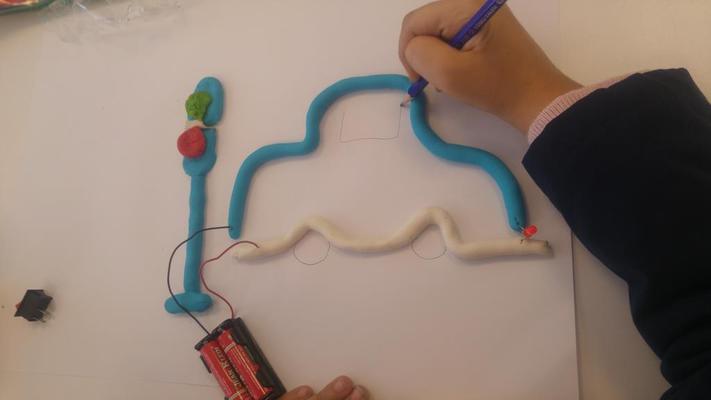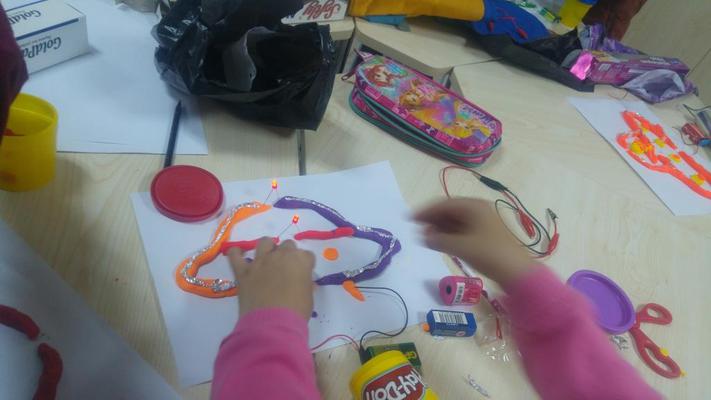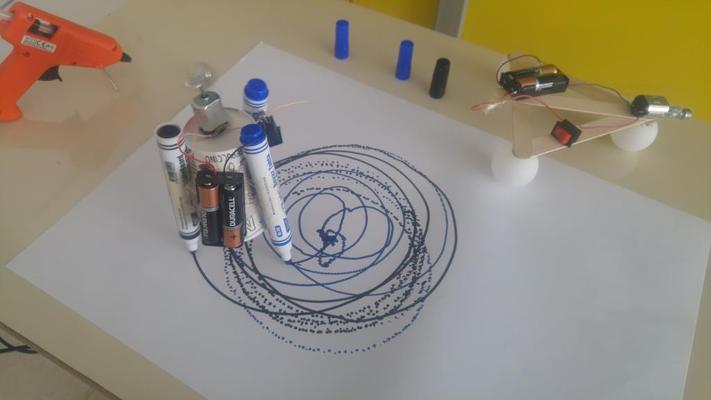- Build/Design/Test
ST BRIGID`S PS, TIRKANE
Here is our latest in class project, using micro motors, some wires and a toothbrush to build a small moving object/robot. The ultimate goal is to create a modern art with self-built robots. I hope you like what you see and I can promise a lot more videos on this topic to follow shortly.
BPS - VISIT W5, STEM MUSEUM
BPS - NURSERY UNIT
STB - VISIT ST PATRICK`S SCIENCE DEPARTMENT
- Electric Circuits
----- PLEASE DO NOT EDIT THIS PAGE ABOVE THIS LINE! -----
ST BRIGID`S PS, MAYOGALL
In the months of December/January our P6 childern were learning about basic electrical circuits and they tested their newly learnt knowledge on real life scenarios. In fact, we are still working on our Board Game making activity, which is linked with another Erasmus+ project of ours, called TMTGuMI.
Hi to everyone! Last week P5 kids learnt the electricity and they realized the first circuit. They maked a squishy circuit and used battery, wire, conductive paste, insulating paste and little led. At the first they learnt how to work a circuit and after they tried to make a circuit. Finally they make creations with their artistic creativity.
Yenişehir Belediyesi Bilim ve Sanat Merkezi-Mersin (Yıldız Kanlıöz)
Learning by doing with easy circuits
Yenişehir Belediyesi Bilim ve Sanat Merkezi-Mersin (Yıldız Kanlıöz)



Giacomo
_______________________________________________________________________________________________
Hi Giacomo,
I hope you managed to find a source from whom you can order some of the DC Motors for our Engineering activities and I am very happy that you wish to join us in exploring our possibilities with these wee gadgets! :)
OK, so in October I posted two videos to see who shows interest in using them and also we had a great talk about it over in Mersin/Turkey at our TPM event.
Now, you might find it interesting that our idea of using these motors, combined with basic electrical circuits or (shouls you too have a set of LEGO 9686 Set) being more creative with the help of LEGO building moving objects, will be presented in Romania on a Teacher Training!!! :)
I`ll spend 10 days in Bucharest and will host a wide range of workshops/trainings on Electrical Circuits / DC Motor / Coding for teachers from 10+ countries! :)
So find two short Intro videos I made and wish me good luck!
Balazs
-----
We know that our students have plenty of experience using everyday household appliances that rely on electric circuits for their operation ( torches, mobile phones, iPods). They very likely have developed a sense that you need a battery or power switch to be turned on to make things ‘work’, and that batteries can go ‘flat’. They tend to think of electric circuits as involving something they call ‘current’ or ‘energy’ or ‘electricity’ or ‘voltage’, all labels which they often use interchangeably. This is unsurprising given that all these labels are frequently used in everyday language with unclear meaning. Whichever label students use, they are likely to see electric circuits as involving ‘flow’ and something being ‘stored’, ‘used up’, or both. Some everyday language, for example about ‘charging batteries,’ may also be a source of conceptual confusion for students.
Although it has been used as an energy source for over 100 years, many people don't understand the basic principles of electricity. Therefore models play an important part in helping us to understand things we cannot see and so are particularly helpful when trying to make sense of electrical circuits.
Within this page, we are to share our work progress from introducing the idea of Electrical Circuits to our pupils, all the way them to carry out a research based circuit building project. We will do our very best to involve all of you in our learning process and ideally we delivere a joint project, where our pupils can and should talk to one another to successfully accomplish this module.
Finally, as this project can be so close to the heart of the (slightly) older generations (like ourselves? :) ), we would like to encourage you to try to involve parents/grandparents in our basic circuit building activities.
Following my rather long intro, here it comes, our video on our preparation for the first lesson on electrical circuits, right after our Halloween Break finishes.
PS: Please let me know what you think of this activity and whether you can join in!
Thanks,
Balazs
-----
Following our very recent TPM in Mersin/TUR, we are now getting ready for building our self made robots. All partners agreed on to make 4 robots to share among each other, using electrict circuts and motors (if possible).
Balazs
-------
For those of you, who already have or wouldn`t mind buying Arduino and/or Raspberry Pi sets, please find these intro videos below to encourage you to join in with some basic coding and electrical circuits projects! :)
Please note that I am still learning how to use/code these devices, so should you have any expertise on those, please do not hesitate to take the lead and let us (me) learn from you! :)
Balazs
----